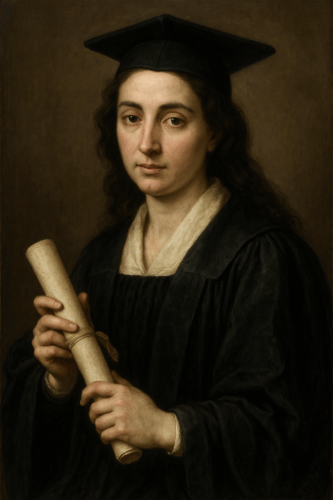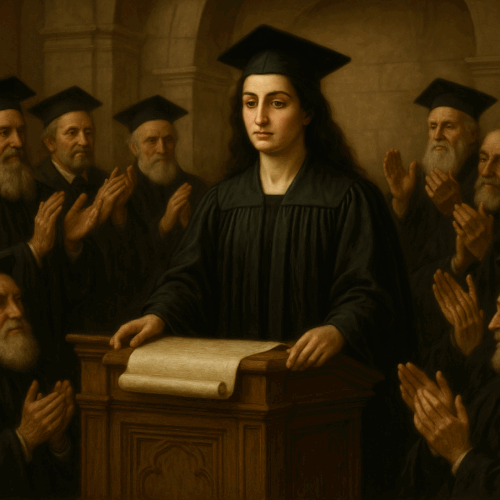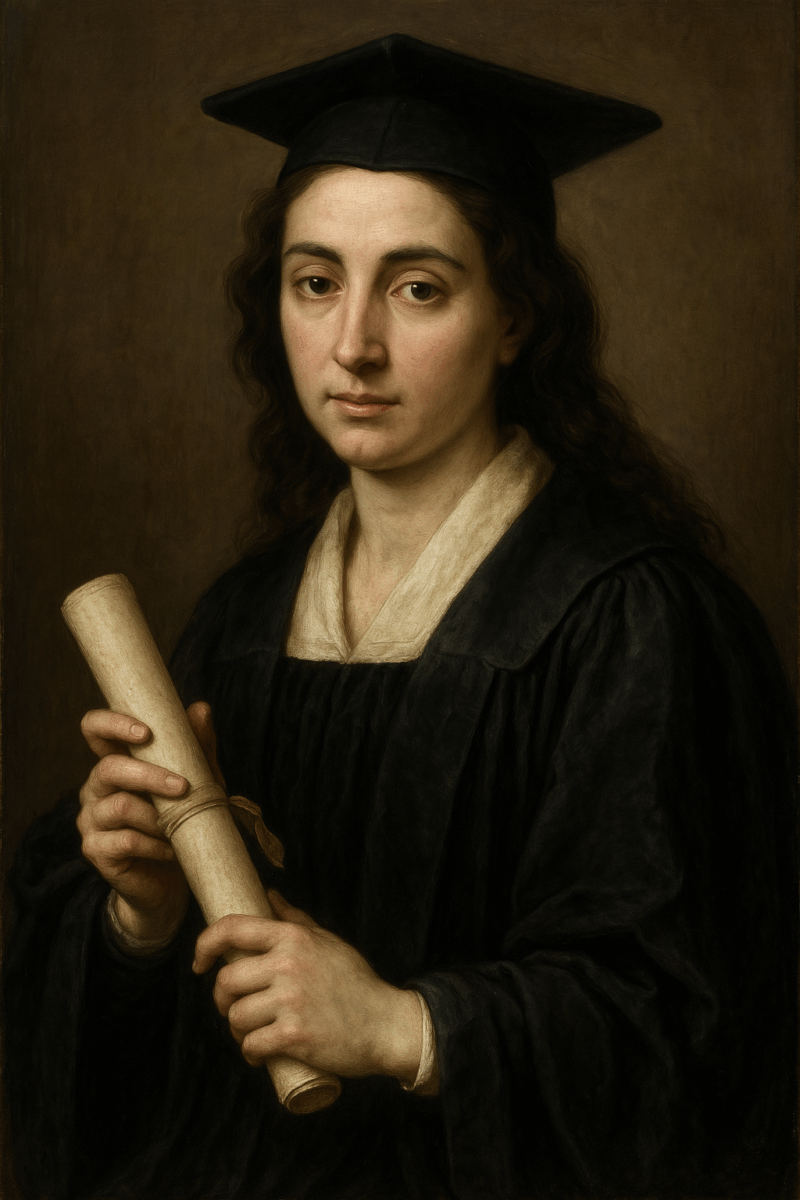On June 25, 1678, in the grand Sala dello Studio at the University of Padua, a moment unfolded that would ripple through centuries. Elena Cornaro Piscopia, a Venetian noblewoman with an insatiable appetite for knowledge, rose to claim a doctorate in philosophy—the first woman ever to do so. In an era when a woman’s intellect was frequently dismissed or constrained, Elena’s relentless pursuit of scholarship broke barriers, rewrote expectations, and sent a powerful message: mastery is earned, not granted.
Today, her story is more than a compelling footnote in academic history. It’s a blueprint for personal transformation. In the chapters that follow, we’ll explore Elena’s journey in vivid detail, uncover the forces she overcame, and translate her triumph into a hands-on plan you can apply in your own life. Prepare to wield the Velvet Key that unlocked Padua’s lecture halls so that it can unlock your greatest ambitions.

## 1. Roots of a Scholar: Venice, 1646–1660
Born into the patrician Cornaro family on June 5, 1646, Elena’s education began long before formal lectures. Her father, Giovanni Battista Cornaro, recognized a spark in his daughter that defied the conventions of 17th-century Venice. While most noble girls received instruction in etiquette, music, or needlework, Elena’s early lessons included:
– Latin and Greek grammar manuals
– Hebrew script and Biblical exegesis
– Euclidean geometry and basic astronomical observations
– Philosophical dialogues by Plato and Cicero
By age 12, she read Aristotle in the original Greek; by 15, she was composing treatises on metaphysics in Latin. Rather than discourage her, Venice’s intellectual circles grew fascinated. Scholars would drop by the Cornaro residence to challenge the teenager with debates on ethics or natural philosophy. She absorbed every question, catalogued each answer, and used criticism to refine her arguments.
Why this matters to you: **Curiosity isn’t optional—it’s foundational.** Like Elena, you can expand your perimeter of possibility by intentionally seeking learning opportunities that stretch you beyond comfort.
—
## 2. Bracing the Barriers: The Road to Padua
By the late 1660s, Elena’s reputation had spread beyond Venice. Yet universities across Italy maintained an unspoken rule: doctoral degrees were reserved for men. When Elena petitioned Padua’s faculty in 1677, she faced a labyrinth of objections:
- **Gender Prejudice**
Senior professors argued a woman’s presence in lectures would “disturb scholarly decorum.”
- **Ecclesiastical Resistance**
The Inquisition frowned on a woman dispensing theological or philosophical discourse.
- **Precedent Shortage**
No known model existed for formally evaluating female intellectuals.
Undeterred, Elena compiled a dossier of her published essays, transcribed testimonials from prominent scholars, and funded private lectures to demonstrate her fluency. Months of negotiations followed; Venice’s Doge even intervened to vouch for her character. In early 1678, the university begrudgingly granted her the right to sit for examinations.

Key takeaway: **Identify and dismantle barriers, one piece at a time.** When change feels impossible, make incremental advances—build allies, gather evidence, and never let “always been this way” be the final word.
—
## 3. A Morning That Shook Academia: June 25, 1678
Dawn broke over Padua’s red-tiled roofs as Elena approached the Sala dello Studio, parchment scrolls in hand. The hall, adorned with frescoes and heraldic banners, was packed. At the center, the rector in robes of black silk would preside over her defense. Elena’s plan:
- **Opening Statement** – A concise overview in Latin, outlining her thesis on the harmony between free will and divine providence.
- **Structured Debate** – Responding to four appointed examiners on ethics, metaphysics, natural philosophy, and theology.
- **Final Oration** – A synthesis of her arguments, crafted to resonate in both logic and eloquence.
As each challenge came, Elena’s responses were measured yet bold. When a professor probed apparent contradictions in her moral framework, she traced back to Aquinas, reconciled divine omniscience with human agency, and cited Scripture in Hebrew to underscore her point. By midday, it was clear: this was no token exercise. At the final pronouncement, the hall erupted in applause. Elena Cornaro Piscopia was, officially and universally, Doctor of Philosophy.

Lesson for you: **Show up prepared, then exceed expectations.** Rigorous groundwork transforms “what-if” scenarios into undeniable realities. Your future triumphs hinge on scrupulous preparation.
—
## 4. The Ripple Effect: Elena’s Enduring Legacy
Elena’s degree did more than secure her personal glory. It provided a symbolic lodestar for the women’s rights advocates two centuries later and for every student who chafed under arbitrary limits. Consider:
– **Mary Wollstonecraft (1792)** cited Elena as inspiration in _A Vindication of the Rights of Woman_.
– **Maria Montessori (1897)** traced her belief in child-centered education to the notion that intellect knows no gender.
– **20th-Century Universities** gradually opened doctoral programs to women, normalizing what was once unthinkable.
Even today, organizations like the International Federation of University Women honor Elena’s anniversary as “Scholar’s Day,” encouraging global initiatives that promote gender parity in STEM and the humanities.
Why it matters to you: **Your personal victory can catalyze systemic change.** When you break molds, you widen the door for those who follow. Your actions speak through the ages.
—
## 5. Translating 17th-Century Tenacity into 21st-Century Growth
Elena’s academic ascent rests on five pillars that remain relevant:
- **Relentless Curiosity**
- **Strategic Scholarship**
- **Public Accountability**
- **Allied Advocacy**
- **Graceful Defiance**
Below, each pillar becomes a performance lever you can pull to accelerate your own progress—whether you’re a graduate student, a career shifter, or a lifelong learner.
### 5.1 Relentless Curiosity
– Develop a “question journal.”
– Dedicate weekly time to explore unfamiliar topics.
– Follow interdisciplinary feeds—physics can inform design; philosophy can sharpen negotiation tactics.
### 5.2 Strategic Scholarship
– Curate a “mastery roadmap” for your chosen field.
– Prioritize foundational texts and salad‐bar elective reads.
– Leverage online platforms (Coursera, Khan Academy, university open courses) for guided learning.
### 5.3 Public Accountability
– Publish progress reports: blog posts, LinkedIn articles, Twitter threads.
– Host quarterly “mini-defenses” via webinars or local meetups.
– Invite critique—invite at least one dissenting viewpoint to stress-test your grasp.
### 5.4 Allied Advocacy
– Seek mentors actively—reach out with clear, concise value propositions (“I’d love 15 minutes to discuss X.”).
– Join or form peer-study pods for mutual support and resource sharing.
– Attend conferences or symposia; solidarity builds confidence.
### 5.5 Graceful Defiance
– Embrace obstacles as evidence you’re pushing boundaries.
– Record every “no” or “you can’t” in a “Resistance Log” and revisit it when motivation dips.
– Cultivate an inner narrative: “This challenge exists because I’m on the right track.”

—
## 6. Your Six-Point Action Plan
Turning inspiration into action demands a concrete blueprint. Here’s a six-step regimen, modeled on Elena’s approach, to unlock your next great milestone within 6–12 months:
- **Identify Your Summit**
- Define a singular, ambitious goal:
– Earning an advanced degree?
– Launching a research paper?
– Mastering a new language or technology?
- Set SMART parameters—specific, measurable, achievable, relevant, time-bound.
- **Construct the Syllabus**
- Break the summit into 6–8 core modules.
- Assign milestones and dates (e.g., Module 1 due in four weeks).
- Source primary materials: textbooks, journal articles, recorded lectures.
- **Engage a Support Network**
- Identify two mentors—one senior expert, one peer collaborator.
- Establish bi-weekly check-ins and progress reports.
- Join 1–2 online communities or local study groups.
- **Stage Quarterly Defenses**
- Host a 30-minute session to present findings or skill demonstrations.
- Record and share online—invite feedback from strangers for unbiased critique.
- Iterate your modules based on insights.
- **Ritualize Reflection and Rewards**
- After each milestone, log lessons learned in a “Scholar’s Diary.”
- Reward yourself tangibly: a special meal, a short trip, or a creative splurge.
- Adjust your plan if you uncover new priorities or interests.
- **Broadcast Your Breakthrough**
- Publish a comprehensive case study—blog, podcast, or video documentary.
- Frame your narrative as the modern continuation of Elena’s legacy.
- Encourage others to share their own “Velvet Key” moments.
—
## 7. Beyond the Degree: Cultivating Intellectual Emancipation
The doctorate Elena earned was a piece of parchment—and yet it represented something far grander: intellectual sovereignty. It demonstrated that when you own your mind, societal rules bend. Her triumph reminds us that:
– **Titles Matter, But Mastery Matters More.** A degree is a milestone, not a finish line.
– **Adversity is a Hallmark of Growth.** Pushback signals you’re redefining norms.
– **Legacy is Co-authored.** Your achievements inspire successors, weaving you into the tapestry of progress.
Whether you’re studying for an exam, scaling a career pivot, or indulging a lifelong passion, the Velvet Key she forged is the same key you can use today. It turns the lock on self-doubt, inertia, and external gatekeeping.

## 8. Conclusion: Your Turn to Forge New Doors
Elena Cornaro Piscopia walked into a lecture hall that told her “no.” She left it proving “yes.” On this June 25, centuries later, you stand at a similar threshold. The world around you—and within you—is brimming with unexplored rooms waiting for your intellect and tenacity.
Take the Velvet Key. Draft your syllabus. Assemble your advocates. Declare your defenses. And let every doubt you shatter become the seed for someone else’s triumph. Just as Elena’s doctorate reverberates through time, your modeled victory will echo for generations of learners yet to come.
Now, turn the page. Your lecture begins today.

